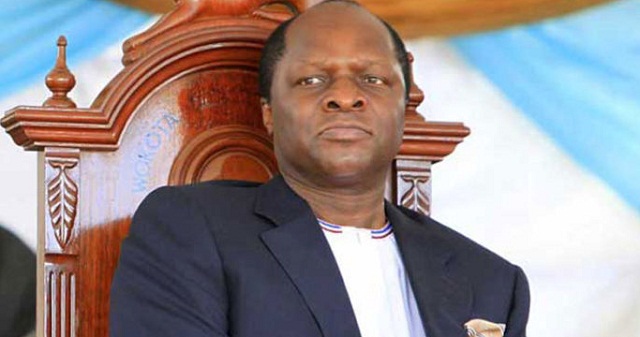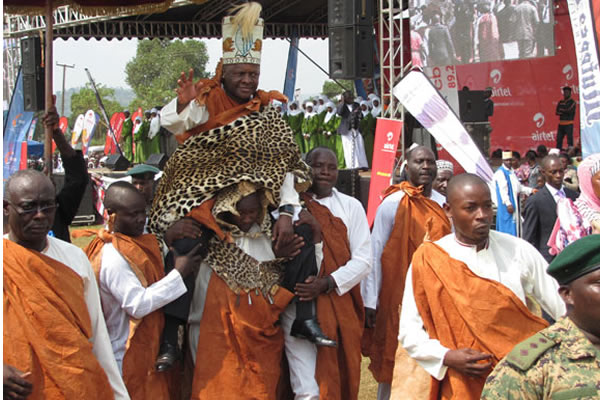
KAMPALA – Twenty-eight years ago on April 3, 1992, the President and commander-in-chief, Yoweri Museveni, convened a meeting of the Army Council in Gulu and resolved to restore traditional leaders as long as they were not to engage in partisan politics.
The army council also resolved to return cultural sites to the kingdoms of Buganda, Toro, Bunyoro, Busoga and Ankole that were conscated by Apollo Milton Obote’s government on September 17, 1967 after the banning of the institutions and the declaration of a republic.
The following year, 1993, kingdoms were restored by the Traditional Institutions Statute, but President Museveni blocked the restoration of the Ankole kingship, saying that the people of Ankole had to decide. … A king may be one ruler too much, because some people say that Museveni wants to be the only ruler of Ankole. A year later in April, President Museveni resolved to return the traditional sites taken by the government in 1966 and 1967 back to the respective cultural authorities and a month later, Museveni and the council agreed to have traditional leaders crowned.
Consequently, Prince Ronald Muwenda Mutebi was installed as the Kabaka of Buganda at a colorful ceremony attended by President Museveni and many other dignitaries on this day, July 31, exactly 27 years ago at Naggalabi in Budo. Kabaka Mutebi’s coronation in 1993 fulfilled a promise made by President Museveni to restore Uganda’s once-abolished monarchies, albeit with some changes. While the old kingdoms were semi-autonomous rivals, constantly competing with the government for power, the new ones were to be constitutional monarchies that concerned themselves only with cultural issues. Prince Mutebi’s enthronement marked the return of kingdoms to Uganda.
The genesis
In late 1985, during the Nairobi Peace Talks between the Junta government of Lt Gen Tito Okello Lutwa and the National Resistance Army (NRA) rebels led by Yoweri Museveni, Buganda Prince Ronald Muwenda Mutebi was secretly flown from London to Nairobi and Kigali and later driven to Luweero Triangle to witness how the war was advancing towards Kampala.
According to Hajj Abdul Nadduli, the former minister without Portfolio and a veteran of the NRA Bush War, Mr Museveni in 1985 invited then Prince Mutebi to the Luweero Triangle as proof that he (Museveni) was keeping his word to restore Buganda Kingdom if they captured power. Nadduli engaged the rebel leader on the restoration of Buganda Kingdom as early as 1981.
Speaking to a local newspaper, Nadduli said that on his first-ever encounter with Museveni, he asked the NRA leader whether he would restore Buganda Kingdom that had been abolished by the Milton Obote government in 1967. Nadduli recalls that a meeting between him and Museveni was held under a tree in Kikandwa village in Luweero District on February 20, 1981, only two weeks after Museveni launched the five-year guerrilla war.
President while addressing Baganda MPs recently disclosed that Kabaka Mutebi offered to join the NRA rebels in Luweero in the early eighties to fight the Obote regime. The President said he met the Kabaka in a secret meeting in London in 1981 in the house of the late Professor Yusuf Lule, then the NRM chairperson.
In the London meeting, the Kabaka expressed willingness to join the bush war, an idea Museveni said he rejected, considering it too risky.
“He could have died there. What was important was not for the Kabaka to fight,” the President told the legislators.
He stressed that after securing victory, he fulfilled his pledge of restoring the kingdoms, despite warnings from various NRM people that the kingdoms would cause chaos. It is the first time Museveni disclosed that he had a meeting with the Kabaka during the bush war.
It should be noted that during his first reign, in 1966, Obote deposed Mutebi’s father, Mutesa II, by storming his palace and abolishing the kingdom. He fled to London where he died three years later. After the death of his father, Mutebi continued to stay in London hopping from job to job. First he was a glass salesman. Then he tried freelance journalism but with hope of returning home to inherit the job he was born into, that of Kabaka of Buganda kingdom.
Mutebi’s hope gained momentum when the NRA war disposed Obote in 1986. Following the NRA victory, President Museveni was summoned by Buganda to fulfil the promises of Ebyaffe, a contemplation from him lasted an entire 5 years before he called for an army council meeting in Gulu on April 3, 1992 to declare the return to kingdoms and chiefdoms.
“The traditional leaders should continue to help us in ensuring that our languages and cultures are preserved. Our vernaculars must be preserved because they are rich and unique. It is a shame to find someone saying they cannot communicate in their native languages,” President Museveni said.
Scientific coronation

This year’s Kabaka Ronald Muwenda Mutebi II’s coronation anniversary is being held at Lubiri-Mengo today, July 31, 2020.
Unlike previous coronation anniversaries, the 27th coronation ceremony will be attended by not more than 50 guests as a way of preventing the spread of Covid19.
Buganda Kingdom existed long before Uganda was colonized by the British more than a century ago. By collaborating with the colonizers, Buganda enhanced its supremacy in relation to the other monarchies. After independence in 1962, Buganda maintained its authority and the kabaka even gained the right to veto federal legislation. This proved too much for Milton Obote’s military regime, which abolished all kingdoms in 1966.
However, the Buganda people, the largest of Uganda’s four kingdoms, appear to have become a major political force once again and this has resurrected debate as to whether nascent democracies like Uganda can successfully contain traditional institutions under modern political systems. While skeptics say the kingdoms are outdated creations that fuel political instability, others say they are an important part of African history that must be cherished.
“Each Buganda belongs to a clan and every clan has a strong relationship with the king. It is a cultural and historical bond that cannot be uprooted,” says Shafik Ntale, a lecturer at Kampala University.
But other people, especially the young, are less concerned, saying that kingdoms are old fashioned and only benefit those close to the king.





